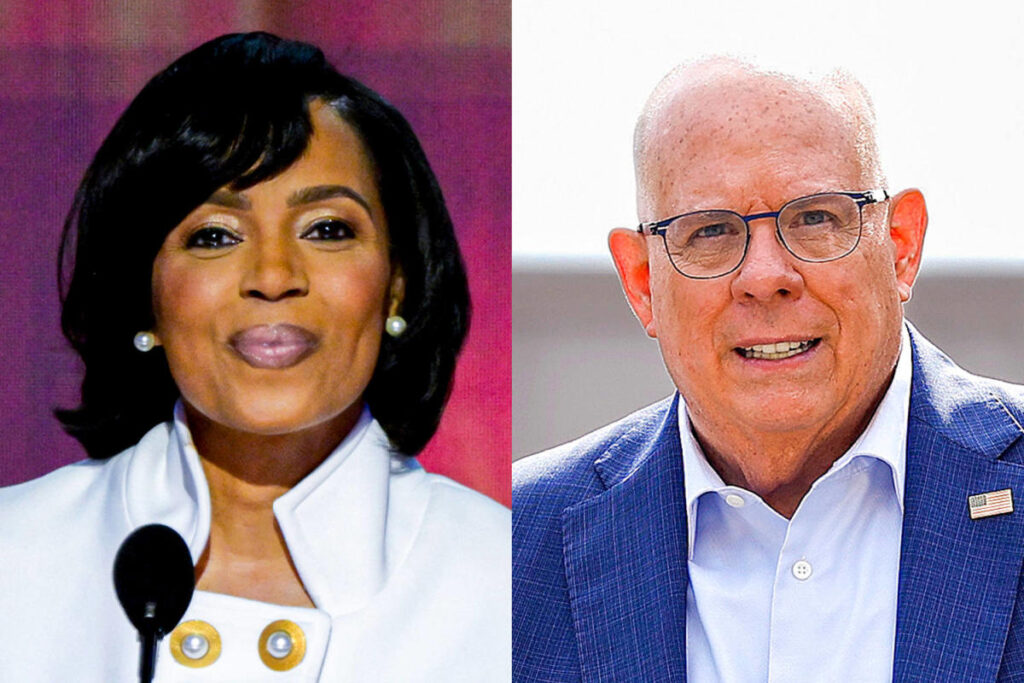In the midst of a competitive Maryland Senate race, Prince George’s County Executive Angela Alsobrooks and former Governor Larry Hogan engaged in a significant debate addressing pivotal issues such as abortion rights, partisan politics, and foreign policy. The candidates emphasized their contrasting perspectives: Hogan positioned himself as a moderate Republican willing to prioritize bipartisan collaboration and allegiance to democratic values over party allegiance. He pledged to prioritize codifying federal protections for abortion—a topic that remains particularly contentious in political discourse today—while also highlighting his previous record as governor in support of women’s access to abortion services. In contrast, Alsobrooks vehemently stressed that a vote for Hogan would equate to endorsing Republican leadership at the national level, threatening reproductive rights and broader support for Ukraine.
Throughout the debate, abortion emerged as a central focus, mirroring the heated rhetoric prevalent in campaign advertising across Maryland. Moderated by NBC News Chief Political Analyst Chuck Todd, the discussion saw Hogan confronting criticism over his GOP affiliation. Despite his assertions of supporting abortion rights, Alsobrooks challenged his claims by pointing to the broader Republican agenda that she argued undermines women’s reproductive freedoms. She contended that Hogan’s party affiliation would ultimately align him with a Republican majority potentially hostile to abortion rights, consequently framing the stakes as a wider issue of organizational values rather than individual stances.
Both candidates acknowledged the heightened polarization surrounding the Supreme Court, albeit in different ways. While Hogan criticized the politicization of the judiciary and displayed ambivalence about his stance on confirming Trump’s appointees, Alsobrooks expressed her concerns regarding the current Court’s alignment with public sentiment. She advocated for judiciary reforms, including term limits or court expansion, to restore balance and representativeness. Hogan, however, rebuffed her suggestions, arguing that attempts to alter court structures only reflect a failure to reach consensus.
The debate did not solely fixate on domestic issues; foreign policy also played a prominent role. Both candidates shared a commitment to maintaining support for Ukraine amid its conflict with Russia, a stance that underscores broader national security interests. However, they diverged on U.S. policy toward Israel and Palestine, with Alsobrooks advocating for a nuanced approach providing support to both Israelis and Palestinians while Hogan underscored unwavering support for Israel as America’s foremost ally. This exchange reflected not only their foreign policy priorities but also underscored the different narratives they project regarding America’s role on the global stage.
Amidst the discussions of larger policy debates, the candidates also addressed personal allegations impacting their respective campaigns. Alsobrooks faced scrutiny over tax credits claimed on a property, which she attributed to an administrative oversight, while Hogan articulated the importance of transparency in political accountability without making it a decisive issue in the race. Their handling of personal narratives and campaign rhetoric further illustrated the broader themes of character, trustworthiness, and transparency—elements voters often consider critically when choosing their representatives.
As the race progresses, both Alsobrooks and Hogan must continue to navigate an increasingly polarized political environment, where their positions on pressing issues like abortion rights and foreign policy could significantly sway undecided voters. National attention and substantial funding from both Democratic and Republican sides further amplify the stakes, with Alsobrooks seeking to secure a historic victory as Maryland’s first Black senator, while Hogan aims to represent a rare Republican voice in a state where Democrats traditionally dominate. The outcome of this race could not only reshape Maryland’s political landscape but also influence the broader national dialogue around partisanship, representation, and crucial social issues.

